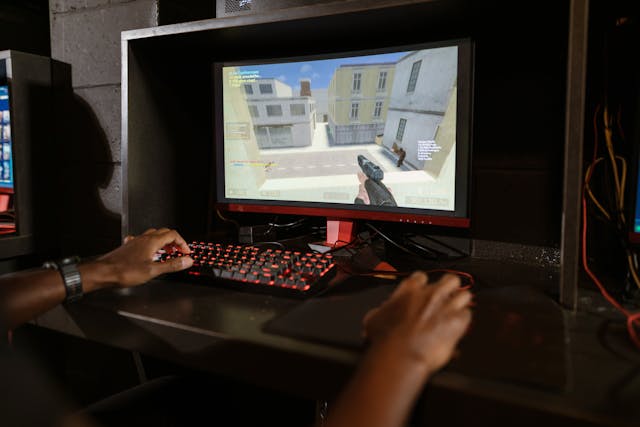It’s no news that modern video games have abandoned single purchases and monthly subscriptions and embraced models that many consider predatory. As a result, game companies have changed how they offer their products to their customers, exchanging the traditional buy-and-play model for models that they find more profitable. In this review, we’ll discuss the current trends in the gaming industry and how certain video game features may be responsible for promoting addictive behaviour.
Table of Contents
The Traditional Buy-to-Play (B2P) Model
Before the popularity of post-purchase and in-game store options, video game developers offered their products to players using the traditional Buy-to-Play (B2P) model. With this model, users buy the game and get the complete package at launch, including several skins, characters, or game modes. Some of these features will have to be unlocked through in-game play, purchase of monthly subscriptions or expansion packs, or payment of a one-time fee.
Nowadays, video game developers prefer the free-to-play (F2P) model because it allows them to attract a wider client base. In addition, the F2P model gives players free access to a fully functional game, albeit with limitations. Players must purchase additional game content (such as extra skins, currency, game modes, or virtual items) from an in-game store to remove these limitations. Such purchases are called microtransactions.
How Does the Loot Box System Work?
A loot box is a video game feature involving a sealed virtual crate that contains a random selection of in-game items, such as costumes, game currency, or weapons. Although some video games allow players to open these boxes by simply playing through the game, most games require players to pay real-life money to unlock loot boxes.
Unlike in-game purchases where players know exactly what they’re paying for, a loot box’s contents are completely random. These boxes offer an inexpensive alternative to buying a specific in-game item directly. So, rather than paying a relatively expensive amount for an item you want, you can buy a cheaper loot box instead and hope that it contains the item you’re looking for.
The contents of loot boxes vary widely. Some video games feature loot boxes with merely aesthetic benefits like announcer packs, costumes, or skins. In contrast, others have loot boxes with items that enhance a player’s competitive advantage (weapons) or their power level. For example, Fortnite and Dota are video games with loot boxes containing aesthetic items, such as skins. On the other hand, games like Path of Exile offer loot boxes with stash tabs that increase your storage chest space, giving you a competitive advantage.
Mobile Games “Gacha” Model
“Gacha” is a derivative of the Japanese word “Gachapon,” for toy capsules vending machines. Gacha games are video games that feature the Gachapon vending machine technique. These games are usually offered based on the F2P model, but the gameplay bottlenecks in two ways:
- Playtime: Gacha games give players limited resources for free, restricting their ability to play the game that refreshes after a specific period. However, you can spend real-life money if you wish to refresh instantly at any point in the game.
- Characters and virtual items: Although you can use certain characters in the game for free, the best characters can only be acquired through a “pull” or “spin” system (similar to a slot machine or roulette wheel). Players can “pull” using a specified amount of in-game currency to receive a random character or other items. You’ll often get a lower chance of “pulls” for free from the game developers, but you can get better “pulls” by buying in-game currency with real money. The most coveted characters have the lowest chances of appearing, forcing players to “pull” many times for their desired outcome. These characters often come with flashy anime-style art (usually the highest quality thing about these games) to entice teens and nerds.
The Emerging Play-to-Earn (P2E) Model Featuring the Metaverse, NFTs, and Crypto Casinos
The metaverse is taking videogame transactions and purchasing to an even higher level. Through virtual real estate, NFT avatar acquisition, and virtual new crypto casinos, the metaverse is paving the path for what may become the future of gaming purchases.
Video games in the multiverse use the play-to-earn model. Thus, players can earn assets with real-world value while playing in the gaming ecosystem. For instance, you can create and own a unique avatar using NFTs, which can be sold to other players in the multiverse for cryptocurrency. The value of your unique avatar increases as more people play the video game and want to buy it. You can then sell the avatar and cash out the crypto for real money.
Virtual casinos are crypto gambling platforms in the metaverse that allow online gamblers to play various casino games. For example, Atari Casino is a crypto casino in the Vegas City district on a virtual universe called Decentraland.
Are Loot Boxes like Gambling?
Loot boxes trigger the same reward mechanism as gambling online. The loot box system is essentially the same as gambling; you are given a chance to win an unknown random prize, with the best prizes having higher monetary values both in and out of the game (similar to hitting the jackpot). Players are known to buy loot boxes obsessively in hopes of finding highly prized items. In some cases, these players can sell the prizes on the steam community marketplace or other third-party auction platforms and spend their earnings in the game to win more prizes.
How Some Countries are Handling the Loot Box Issue
Based on concerns about the similarities between loot boxes and gambling, many countries have taken decisive actions to limit the availability of these boxes. Here are examples of how some countries are handling the loot box issue:
- The UK: Currently, loot boxes are legal in the United Kingdom since, according to The Gambling Commission, the 2005 Gambling Act does not cover loot boxes. Thus, the Commission cannot exercise any regulatory power against them. However, the Gambling Commission has expressed concerns about the behavioral patterns associated with loot boxes and urged the government to reconsider its legality.
- The Netherlands and Belgium: Loot boxes are illegal in Netherlands and Belgium. In 2019, The Dutch Gaming Authority imposed a hefty financial penalty on certain games with loot boxes after declaring them as being the same gambling. Shortly after, the Netherlands took action against loot boxes, Belgium also declared them illegal forms of gambling, effectively banning them. Due to the regulations in these countries, the recently released Diablo Immortal game was banned in these regions.
- Japan: Japan took the first step in regulating loot boxes in 2012 when its Consumer Affairs Agency banned Complete Gacha. The agency banned the game because it violated laws against deceptive practices and forced players to keep buying boxes so they could progress in the game.
- Most of Europe and the US: Loot boxes are considered legal in the United States and most European countries. It is up to the consumer to monitor their behavior and limit their spending.
Conclusion
Initially, game developers included microtransactions in their products to finance software updates and develop new features that’ll make their games more enjoyable. However, modern game companies have reinvented these transactions as tactics to keep players addicted to spending excessively on in-game items.
Unfortunately, many in-game transactions have been found to trigger behaviours similar to those consistent with online gambling. Which begs the question– although these transactions are supposed to be harmless, how do we know where to draw the line between fun, chance, and gambling?
While a few countries have imposed regulations to protect their citizens from falling prey to these predatory transactions, many still consider them outside the gambling scope. Hence, the burden lies on the players to keep themselves in check so they don’t become addicted to spending obsessively on microtransactions.








Leave a Reply